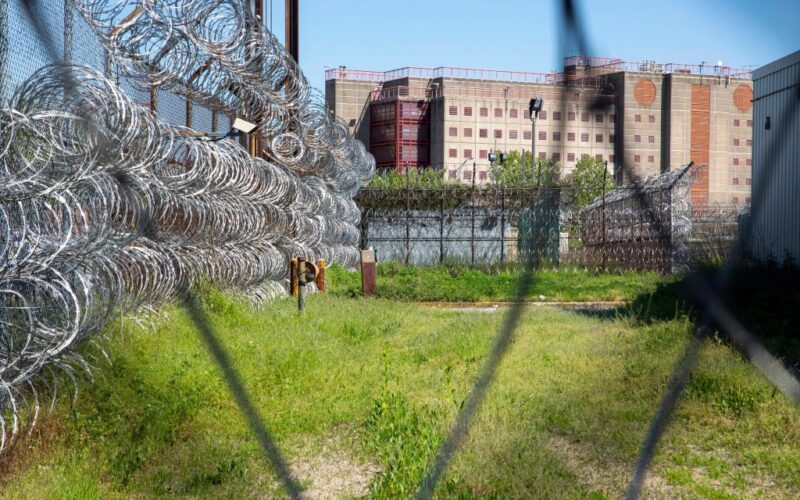One could argue, as his lawyers have for months, that Luis Bernier should be out of prison by now.
Instead he has languished on Rikers Island since March 12 because he can’t get transferred to prison due to the ripples still emanating from the state prison guards strike that ended in March.
Bernier, 34, is one of roughly 1,000 people, the city Correction Department confirmed Thursday, in the city jails ready to go upstate to serve sentences, but in limbo since the state paused then slowed transfers as a result of the staffing shortfall after Gov. Hochul fired 2,000 guards who refused to return to work.
The backlog has inflated the jail population by 13%, pushing it from 6,722 on Feb. 15 before the strike began to 7,605 as of Thursday, Vera Institute records show. One judge described the situation as a “crisis” — and it is only likely to get worse as the underlying staffing issues upstate continue.
In Bernier’s case, he pleaded guilty in late 2024 to a mugging and a burglary and was sentenced to relatively short 1.5 to 3 years sentences in each. He had already been paroled for the mugging when the prison guard strike started, and needed to get back to prison so he could see a parole board that could release him on the less serious burglary case, his lawyers said.
But state prison officials and Attorney General Letitia James’s office have taken the position that the parole process can’t start until he reaches a prison.
As a result, his lawyers filed a contempt of court motion April 18 that was granted for failing to transfer him in a timely manner and arguing for virtual parole hearings on Rikers.
Christopher Boyle of New York County Defender Services and one of Bernier’s lawyers said anecdotally there are many others on Rikers Island in a similar predicament. For each person moved upstate each week, he says, two more are sentenced to prison.
“The inadequate staffing of NY State DOCCS is directly resulting in the unlawful continued imprisonment of vulnerable inmates with no recourse,” Boyle said. “Their number grows by the day with no end in sight and it is indefensible.”
Bernier’s case in sum offers a window into the upheaval that has resulted since the strike – leading public defender groups and at least one judge to urge authorities to take unusual steps to deal with the swelling backlog.
“The delay of these individuals being brought upstate is, in no uncertain terms, a crisis, which alarmingly remains unaddressed by either the city or state agencies,” said Manhattan Judge Sara Litman in a hearing Wednesday on Bernier’s case.
“Nearly four months after the strike, there is no clear indication why calculations and interviews cannot be conducted virtually or at Rikers Island to address this continuing crisis.”
Litman added “with regret” she could not order the city and state to comply but “merely implore” them to address the situation.
The backlog is also causing a secondary problem – the smaller county jails upstate will fill up faster and thus likely will receive priority, officials said.
Assistant state Attorney General Michael Keane acknowledged as much on Wednesday.
“Those counties, those local jails, do not have the same facilities to provide services … It’s kind of like Mayberry RFD,” Keane said, referring to the sitcom from the late 1960s.
“They don’t have a medical staff, they don’t have mental health unlike the bigger counties, like New York’s Rikers Island. So individuals in those counties may be getting … moved up on the list.”
Overall, Keane insisted, “The numbers that we’re all talking about are speculative and they change every day. There is movement and it is picking up.”
Meanwhile, the lack of bed space in state psychiatric facilities is also gumming up the works for people found unfit for trial, Boyle said. Some 182 people with serious mental illness in the city jails are waiting for one of those beds, city correction officials said Thursday.
“OMH (the state Office of Mental Health) is not moving anyone,” Boyle said, noting the state can’t even comply with judicial emergency orders.
For its part, city correction officials say they have with Board of Correction approval expanded beds in dorms in several jails and consolidated units to create more space for male detainees in the women’s jail, the Rose M. Singer Center.
“We have had to make several operational changes to accommodate state ready persons remaining in our care,” said Patrick Rocchio, a DOC spokesman.
“This has been a challenge, and one that has added extra pressure to a system with resources that are already stretched thin, but we are grateful to the men and women of this Department who have made it work.”
State prison officials are also trying to address the problem. The number of state correction officers declined from 12,700 in 2024 to 9,813 in June, state figures show.
Thomas Mailey, a spokesman for the Department of Corrections and Community Supervision, said the state resumed transfers May 5 to male facilities and on April 14 to female prisons.
There is a recruitment drive and the latest state budget law lowered the minimum hiring age of officers from 21 to 18, Mailey said. They will get additional training and mentorship and be limited from certain roles, he said.
“Since the illegal job action, the Department has slowly been working with counties to reduce the backlog of state ready incarcerated individuals coming into DOCCS custody to serve their sentences,” Mailey said. “We have increased the number of individuals we are accepting into DOOCS custody.”
He added, “We are monitoring the conditional release dates of those state ready in county jails and if someone has an approaching date, they are moved higher on the list to be accepted into the Department’s custody.”
Bernier was arrested in September 2023 after a Bronx man reported two men punched, choked and threatened him with a knife, then stole his moped, cell phone and house keys, records show.
He was arrested again that month in Manhattan for breaking into an Upper East Side supermarket and stealing paper towels and laundry detergent, records show.
He pleaded guilty in the Manhattan case on Nov. 19. One day later, he was sentenced in the Bronx case to 1.5 to 3 years in prison.
He was then transported to prison, interviewed by state parole and granted parole in the Bronx case.
Bernier wasn’t produced from upstate for his sentencing in the Manhattan case on Jan. 13 or Feb. 11, days before the prison strike.
The strike ended March 10. Bernier was brought from prison to court in Manhattan on March 12 and sentenced to the same 1.5 to 3 years he received in the Bronx.
The months ticked by as he waited on Rikers to go upstate. On April 18, his lawyer filed a demand with the court that Bernier be immediately transferred. Judge Litman agreed and signed the order.
Another month passed. On May 22, his lawyer filed to hold the state in contempt.
That filing triggered two hearings before Litman. On Wednesday, she held off on making a decision on a technical issue that requires Bernier’s lawyers to re-file their contempt demand.
She accepted the Attorney General’s contention that Bernier would be transferred “imminently” and would see a parole board in July.
“Mr. Bernier we know is on a list. We don’t know exactly where he is on the list, because it changes every day,” Keane said.
As of Friday afternoon, Boyle said he had received no word about Bernier’s transfer.
“Parole hearings are only given once a month, and there are other requirements. Because his conditional release date is in September, the likelihood he will get out before then is nearly zero,” Boyle said.








